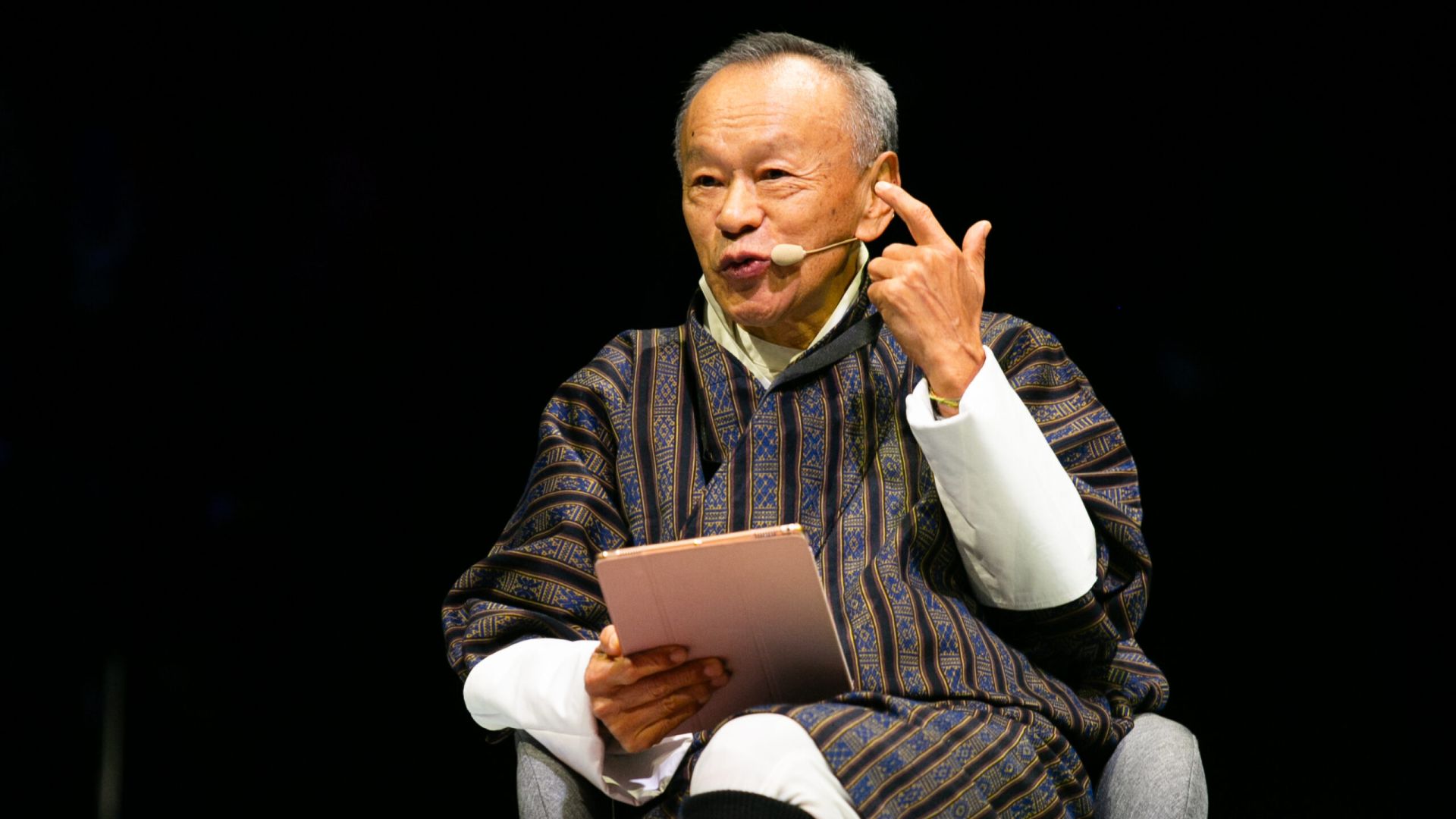 Jigmi Thinley, prime minister of Bhutan, at the ‘Sustainability and Decision Making’ session, Culture Summit 2024. Courtesy DCT Abu Dhabi.
Jigmi Thinley, prime minister of Bhutan, at the ‘Sustainability and Decision Making’ session, Culture Summit 2024. Courtesy DCT Abu Dhabi.
ABU DHABI, United Arab Emirates, March 04, 2024 (GLOBE NEWSWIRE) — The sixth edition of Culture Summit Abu Dhabi opened yesterday in the UAE capital, gathering over 200 speakers and 1,150 participants from 90 countries to identify ways in which culture can transform societies and communities worldwide.
“Our ambition at Culture Summit Abu Dhabi is to identify ways in which culture can transform societies and communities worldwide and turn that into actions and solutions,” – said His Excellency Mohamed Khalifa Al Mubarak, Chairman of the Department of Culture and Tourism – Abu Dhabi (DCT Abu Dhabi), in his welcome remarks.
As part of the unravelling of the intricate relationship between culture and time, former prime ministers from Mali, Canada, Greece, and Bhutan urged leaders and practitioners from the creative and cultural industries to unleash their creative power in the face of “de-civilisation”.
“You are powerful and have a role to play,” said Jigmi Thinley, prime minister of Bhutan from 2008 to 2013. “Dream again, give us hope and wake us up from sleepwalking to doom. Unleash your creative power, you are not compromised.” Thinley was joined by fellow Club de Madrid members Kim Campbell (Canada), George Papandreou (Greece), and Moussa Mara, former prime minister of Mali where the average is 17 and 80 percent of the population is under 40, who echoed his sentiment. He stated: “Culture is the way to youth in our country. We need to create a real cultural sector to unite us within.”
The Summit’s first keynote speaker, essayist, and leader of the modernist movement in contemporary Arabic poetry Adonis, also underscored the role of culture in upholding our shared humanity, as did HE Razan Khalifa Al Mubarak, UN Climate Change High-Level Champion for COP28 and President of the International Union for Conservation of Nature, who also addressed issues around the congruence between geological and mechanical time, which she noted need cultural reformation.
Adonis said: “Time is a creation, and we are living in an era of technological advancements and modernism, enslaving us where it should have set us free. At the Culture Summit, we share one common goal with distinct yet similar views on culture, poetry and art. We are living in an era where nature and creativity are the need of the hour.”
Nobel Prize of Literature laureate Wole Soyinka’s own examination of the Summit’s overarching theme touched on cultural decentralisation, and how over the years, culture has been—and continues to be—decentralised away from “traditional” cultural capitals. This “means that Paris is just one of the centres, Sharjah can be one centre, and Abu Dhabi can be one centre,” he said.
Soyinka continued: “Art can reconcile us. Restitution is not about money. […] We are talking about the return of all the artworks which were looted from Africa. I say if you give it back, we will forgive everything – just give back those artworks and we will be friends forever.”
The opening day was punctuated by creative conversations and performances by leading cultural practitioners, including Emirati musician, composer and singer and Goodwill Ambassador at Large Hussain Al Jasmi, award-winning choreographer and director Wayne McGregor OBE, Michael and David Uslan, and Emirati poet and artist Nujoom Al Ghanem who presented a performance commissioned specifically for the Summit.
The sixth edition of the Summit will run until 5 March at Manarat Al Saadiyat in Abu Dhabi.
For more information on Culture Summit Abu Dhabi, its full programme, and sessions available to watch online, please visit www.culturesummitabudhabi.com.
Culture Summit Abu Dhabi Press Kit, including imagery, is available here.
PRESS ENQUIRIES:
Anastasia Lander, Pelham Communications
anastasia@pelhamcommunications.com
About the Department of Culture and Tourism – Abu Dhabi
The Department of Culture and Tourism – Abu Dhabi (DCT Abu Dhabi) drives the sustainable growth of Abu Dhabi’s culture and tourism sectors, fuels economic progress and helps achieve Abu Dhabi’s wider global ambitions. By working in partnership with the organisations that define the emirate’s position as a leading international destination, DCT Abu Dhabi strives to unite the ecosystem around a shared vision of the emirate’s potential, coordinate effort and investment, deliver innovative solutions, and use the best tools, policies, and systems to support the culture, creative and tourism industries.
DCT Abu Dhabi’s vision is defined by the emirate’s people, heritage, and landscape. We work to enhance Abu Dhabi’s status as a place of authenticity, innovation, and unparalleled experiences, represented by its living traditions of hospitality, pioneering initiatives and creative thought.
About Club de Madrid
Club de Madrid is the world’s largest forum of democratic former Presidents and Prime Ministers, who leverage their individual and collective leadership experience and global reach to strengthen inclusive democratic practice and improve the well-being of people around the world. As a non-partisan and international non-profit organisation, Club de Madrid counts on the hands-on governance experience of more than 100 Members from over 70 countries, along with a global network of advisers and partners across all sectors of society. This unique alliance stimulates dialogue, builds bridges and engages in advocacy efforts to strengthen public policies and effective leadership through recommendations that tackle challenges such as inclusion, sustainable development and peace, at the national and international levels.




